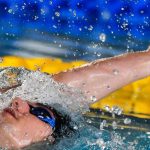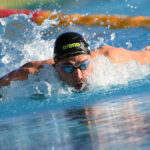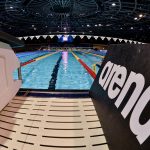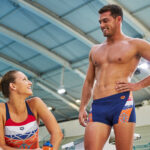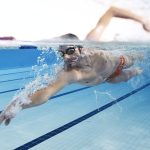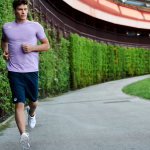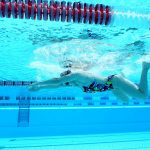Swim nutrition tips and advice from the inside
We asked Jenny Fridlund, nutrition counselor for the Swedish Olympic Committee, cross-country skiing team, sailing team and the swimming team, as well as owner of the “Alla Tiders Matlagare” restaurant company in Stockholm, questions and advice on nutrition to support performance in sport.
1. Jenny, in your experience as a nutrition counselor, how do swimmers’ diets differ from that of skiers and sailors?
Swimmers’ diets do not differ significantly from other athletes: there are only a few variables to be taken into consideration, which possibly may have some influence on diet, i.e. if you prefer to swim early in the morning or late at night.
Having said this, diet depends very much on how hard your training schedule is and how much energy you need for it. For every single athlete, the diet has to be varied and complete, that means enough carbs, proteins and fat in order to get the right vitamins, mineral and antioxidants.
2. What, in your opinion, is the right and wrong approach to food & drink?
That’s a difficult question. Diet can be very personal: something that works for one person, does not necessarily work for the next. But a keynote is to match the body’s energy need, in order to have an efficient body which is able to maintain or gain muscle/weight, rather than debilitating it.
Timing is very important. Carbs are essential and need to be eaten at the right time, when the body effectively needs them and of course when you train. Then to make the constructive environment complete, it is necessary to secure the right amount of proteins, vitamins, minerals and antioxidants.
 3. But it is commonly acknowledged that people often see carbs as the enemy. Is there a recommended balance between carbs and proteins to suggest to swimmers?
3. But it is commonly acknowledged that people often see carbs as the enemy. Is there a recommended balance between carbs and proteins to suggest to swimmers?
If you train you don´t need to be afraid of carbs. Your body needs them in order to perform at its best. Just to give you an idea of body consumption, consider that the brain alone burns 100g of carbs per day. During a ‘training free’ day, the body naturally needs between 250 – 350 gr of carbs. You can then (as a rough guide) add approx. 100 gr of carbs on top of this number, per training session.
Athletes need to pay special attention to carbs in their diet, because the body finds it difficult to store them and if it is “empty” during a training session, it breaks down instead of building up.
Carbs can be found in different types of food, such as bread, muesli, oat, rice, pasta, potatoes, bananas, dried fruit and juices.
Proteins on the other hand, are much easier to store, so are easier for your body to access when needed. It is crucial to eat some kind of protein in every meal you take during the day. They can be found in dairy products, eggs, beans, fish, chicken and meat.
I often suggest that athletes learn to calculate the amount of carbs and proteins present in food, so it becomes easier to prepare and eat a balanced meal.
4. What do you suggest to snack on during the day and prior to training?
Snacking has to be chosen according to the workload and the quality of the training. It has to contain both carbs (ca 80 gr.) and proteins (ca 15-20 gr.). It could be a yogurt, a sandwich with cold cuts and a glass of milk, cottage cheese and a glass of juice or a smoothie and banana.
5. And what about re-fueling food following a training session?
I would suggest something similar to what I mentioned above. Something that mixes carbs and proteins. Sometimes, I suggest eating a meal within 1 hour following a training session instead of re-fueling food. 10 – 12 gr. proteins, 1,2 gr. carbs / kg bodyweight. And one important piece of advice: never forget to replace the amount of water you have lost.
6. Can you give us a few basic nutritional pieces of advice to bear in mind while training?
Breakfast, lunch and dinner are important. I would add two snacks in between, and that’s enough. If the workout is in the morning, it can be helpful to eat a light meal the night before, i.e. muesli with yogurt and a sandwich. You will need to fill up with extra energy in the morning.
To start a training day properly, a good breakfast is recommended: porridge and berries or yogurt and muesli. Eggs, bread with topping and a glass of juice will help you on your way.
Written by:
Antonella Lupica
Antonella is a freelance writer who has an amazing relationship with water and sports in general. She likes swimming with her two little children, and has done since they were 3 months old (now they are 3 and 6 years old), teaching them to embrace and not fear the water. She also enjoys swimming alone, where she experiences true wellness and relaxation. She is curious and loves investigating new trends in sport and lifestyle.
